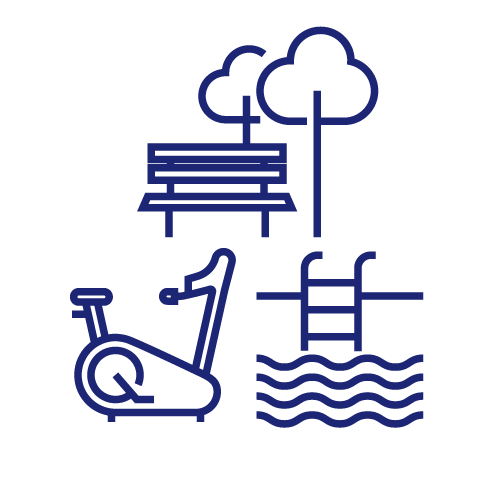The number of condo units in Canada is steadily rising, with condominiums accounting for roughly 15% of the country’s housing. In major urban centres like Toronto and Vancouver, this share is considerably higher, with condos representing between 25% and 35% of occupied homes1.
What makes condos so popular?

Affordability |

Convenience |

Security |

Low Maintenance |
They can be especially appealing to first-time buyers, people looking to downsize and those who want to live in walkable neighbourhoods without the hassle of keeping up a detached home.
But buying a condo versus a house comes with a few important considerations. If you’re looking to sell, it’s important to understand what potential buyers are looking for so you can market your unit appropriately. Here are some key considerations for both buying and selling a condo in today's market.
Tips for Buying a Condo
Beyond the typical homebuying checklist, buying a condo involves getting familiar with condo-specific details that can affect your costs, lifestyle and long-term happiness. Here are 10 things to keep in mind.
1. Condo Fees |
1. Condo FeesEvery condo comes with monthly maintenance fees. These fees cover shared building expenses such as the upkeep of common areas, security, amenities (like a gym or a pool) and in some cases, utilities such as water or heat. Be sure to ask what the fees cover and find out how they compare to other buildings in the area. |
2. Reserve Fund |
2. Reserve FundThe reserve fund is a pool of money set aside by the condo corporation for major repairs and future capital expenses. A healthy reserve fund signals that the building is well-managed and financially prepared for the future. Details about the reserve fund can be found within the status certificate. |
3. Status Certificate (or similar documentation) |
3. Status Certificate (or similar documentation)In most provinces, buyers are entitled to a package of documents that outline the legal and financial health of the condo corporation. In Ontario, this is formally known as a status certificate – the terminology is different in other parts of the country. |
4. Special Assessments |
4. Special AssessmentsIf there isn’t enough money in the reserve fund to cover necessary repairs, condo owners are charged a lump sum called a special assessment. Before making an offer on a condo, ask if there have been recent assessments or if any are planned. |
5. Rules and Bylaws |
5. Rules and BylawsEvery condo has its own set of rules. These might include pet restrictions, smoking policies, guidelines for renovations or window coverings, and rules around renting your unit. You’ll want to make sure you’re aware of the rules and that they align with your lifestyle. |
6. Building Age and Condition |
6. Building Age and ConditionOlder buildings tend to have larger units and lower purchase prices but could come with higher maintenance costs. Newer buildings might have better amenities, but the units themselves could be smaller – and their reserve funds not yet robust. It’s important to weigh the trade-offs of newer versus older buildings. |
7. Building Management |
7. Building ManagementStrong property management is not always considered at the buying stage, but it’s an important factor in your experience as an owner. Well-managed buildings tend to be better maintained, with fewer issues. It’s worth speaking to residents or your real estate agent to get a sense of how responsive and organized the management is. |
8. Parking and Storage |
8. Parking and StorageNot all units come with parking or a storage locker, and some are sold or rented separately. Clarify what’s included and what the costs are – if any. |
9. Construction Quality |
9. Construction QualitySoundproofing, insulation and the quality of the unit will be important to you after you move in. It may be worth hiring a home inspector who specializes in condos to provide an assessment. |
10. Location Within the Building |
10. Location Within the BuildingWhile many homebuyers pay close attention to the location of the property itself, with a condo you’ll also want to consider where the unit is within the building. Think about things like noise, views, natural light and privacy. Units near elevators, garbage chutes or above communal areas could be more disruptive. |
Tips for Selling a Condo
Selling a condo? The same factors that affect buying decisions become points for you to highlight. Showcasing the strengths of your unit and addressing buyer concerns proactively can help you stand out in a competitive market. Here are some top tips for selling your condo.
1. Stage for Space |
1. Stage for SpaceCondos are typically compact, so it’s important to make the space feel open and functional. Staging with streamlined furniture, good lighting and neutral colours can help buyers envision themselves in the unit. |
2. Invest in Quality Photos and Floor Plans |
2. Invest in Quality Photos and Floor PlansMost buyers start their search online, so high-quality photos (and possibly a virtual tour or 3D walkthrough) are essential to get your condo on a buyer’s consideration list. Floor plans can also help buyers understand the layout and visualize how their furniture would fit in the space. |
3. Highlight Amenities and Location |
3. Highlight Amenities and LocationYour listing should showcase not just the unit, but also what the building offers – whether that’s a concierge service, gym, rooftop terrace or party rooms. Be sure to mention transit access, nearby shops, restaurants and parks to give buyers a sense of the lifestyle they could enjoy. |
4. Prepare the Condo Documents Proactively |
4. Prepare the Condo Documents ProactivelyIt’s a good idea to have your status certificate and other key documents ready before a buyer asks for them. This can help speed up the sale process (occasionally, it takes some time to get the documents ordered) and build trust with serious buyers. |
5. Make Inclusions Clear |
5. Make Inclusions ClearIf the unit includes parking, a locker or appliances, be sure to highlight these perks! Are you selling any furniture with the unit? Let the buyers know to make an offer. It’s also important to be upfront about condo fees and what they cover, so the buyer views you as a transparent seller. |
6. Make Minor Repairs |
6. Make Minor RepairsWhile cosmetic issues such as peeling paint, leaky faucets or loose fixtures might not cost much to fix, they can make a big difference in how the space shows to others. Make your space look its best! |
7. Be Flexible and Responsive |
7. Be Flexible and ResponsivePrompt responses to showing requests and being open to feedback can improve your chances of a quicker sale. |
8. Work With an Experienced Agent |
8. Work With an Experienced AgentChoose a real estate agent who has experience with condo sales and understands how to market the building – and the unit. Their insight into pricing, staging and negotiations may help you sell your unit faster, and at a higher price. |
Whether you’re looking for your first home or planning your next move, buying or selling a condo comes with a few extra steps and details to consider. But if you’re prepared, organized and ask the right questions, the result should be a positive experience.
1 The majority of condominiums in Canada in 2021 are in census metropolitan areas




